
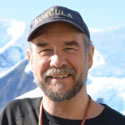
University of Hawaiʻi at Mānoa
Craig Smith is a Professor of Oceanography at the University of Hawaii and lead investigator of the DeepCCZ Project. His research and conservation efforts have focused on the vast and poorly understood ecosystems in the deep-sea and in Antarctica, where high diversity, fragile habitats, and slow recovery rates cause ecosystems to be especially sensitive to human impacts and climate change. As a Pew Fellow in Marine Conservation, he spearheaded the recommendations to the International Seabed Authority (ISA) to protect nine areas, covering 1.44 million square kilometers, from deep-sea mining to safeguard biodiversity and ecosystem function across in the Clarion-Clipperton Zone. The biodiversity of these protected areas (called Areas of Particular Environmental Interest, APEIs) is the research focus of our May-June 2018 expedition aboard the RV Kilo Moana.
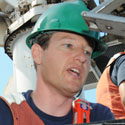
Professor, University of Hawaiʻi at Mānoa
Jeffrey Drazen is a professor in the Department of Oceanography at University of Hawaii, Manoa. His research interests are the trophic ecology and energetics of the open ocean and deep sea, particularly fishes. Recently his research has explored the structure of deep sea and pelagic food webs using stable isotopes and other biomarker techniques, evaluated abyssal fish and scavenger populations in areas that will be mined for metal resources, and examined the structure and function of trench communities including the Mariana and Kermadec Trenches. Much of his research has been in collaboration with fisheries scientists and he is a senior fellow of the Joint Institute for Marine and Atmospheric Research. Jeff earned his PhD from Scripps Institution of Oceanography and he was a postdoctoral fellow at the Monterey Bay Aquarium Research Institute. He has authored and coauthored over 100 scientific articles and book chapters and he has been on 58 research cruises, often as chief scientist. More information on his lab group can be found at www.deepseafishecology.com ![]() .
.
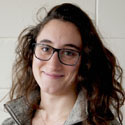
PhD Student, Heriot-Watt University
Marta Maria Cecchetto is currently completing her PhD in Marine Biology at Heriot-Watt University with Dr. Andrew K Sweetman. Her project studies the impacts of deep sea mining and climate change on the deep seafloor biomes of the western Clarion-Clipperton Zone and Antarctica, focusing on comparing benthic ecosystem functioning data from western Areas of Particular Environmental Interest (APEIs) to contractors claim areas in order to estimate and monitor the effectiveness of these APEIs as preservation zones. Marta holds a Bachelor with Honours degree in Marine Science from the University of the Highlands and Islands at the Scottish Association of Marine Science in Scotland. On this cruise, Marta will be part of the deep-sea landers team conducting pulse-chase experiments with isotopically enriched algae and microprofiling the deep seafloor to obtain data regarding oxygen, nutrients, CO2 exchange rates (fluxes) at the benthic boundary layer. This is her first research cruise.
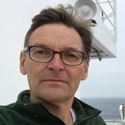
Associate Professor, University of Gothenburg, Sweden
Senior Scientist, Uni Research, Norway
Dr. Thomas Dahlgren is interested in why we find marine species where we do and what the processes are that shape these patterns. Animals living in or on the seafloor in the deep sea is a nice place to do this research. He uses both old-fashioned morphological methods to recognise different species (or describe new ones) as well as more modern molecular data such as DNA barcoding. He is also interested in how marine species spread from one place to another and uses genetic data such as “fingerprinting” to calculate how related animals from one place are with animals from another place.
While he will not be onboard the Kilo Moana on this cruise, he will work with analyses of the samples and images that Helena, Kirsty, and Regan have brought back.
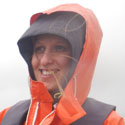
Research Assistant, Natural History Museum, London
Regan Drennan has a Bachelor’s degree in Zoology from Dublin University, Trinity College, and has recently completed her Master’s Degree in Taxonomy & Biodiversity from Imperial College London, in conjunction with the Natural History Museum, London. During her masters, she worked in Dr. Adrian Glover’s Deep Sea Systematics & Ecology research group, and primarily studied the molecular and morphological taxonomy of deep sea sternaspid polychaetes from the Southern Ocean and South Orkney Islands, supervised by Dr. Glover and Dr. Helena Wiklund. On this cruise, Regan will be involved in live specimen sorting and photography, DNA sampling, and morphological identification of megafauna. She is really looking forward to what will be her first cruise!
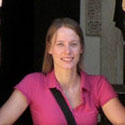
Postdoctoral Scholar, University of Hawaiʻi at Mānoa
Dr. Durden is a postdoctoral fellow with Craig Smith, and will be examining the benthic megafauna from seabed photographs and video captured on the cruise. She is a deep-sea ecologist and engineer interested in the structure and function of deep-sea ecosystems, and in human impacts on the environment. She completed her PhD at the University of Southampton, UK in 2016 on the ecology of abyssal plains, and on improving photographic methods for observing the deep-sea environment. Her previous postdoctoral work has investigated the impacts of deep-sea mining on sediment habitats, and contributed to the development of environmental policy for this emerging industry.
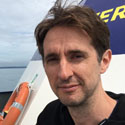
Deep-Sea Systematics and Ecology Group Lead, Natural History Museum, London
Adrian Glover leads the Deep-Sea Systematics and Ecology Group at the Natural History Museum (NHM), London. We are an active research group dedicated to the highest-quality deep-ocean and polar research, with emphasis on molecular systematic and ecological approaches to fundamental questions in biology. The deep-sea is the world largest and least-explored ecosystem, and our group undertakes regular oceanographic expeditions to sites across the world, from the poles to the tropics. We use the latest DNA taxonomy methods to describe new species, study their evolutionary origin, investigate their ecological interactions and test general theories in biodiversity sciences. The deep-ocean is the world’s largest new resource frontier and is currently being actively explored for marine mineral extraction, new hydrocarbon industries and deep-water fisheries. We are committed to providing the highest-quality scientific data to support the sustainable management of these new industries through national and international regulatory bodies. The NHM receives in the region of 5 million unique visitors per year, and I contribute extensively to a range of public engagement activities to showcase our research, the remarkable collections housed in the NHM Darwin Centre and the importance of sustainable solutions to ocean management.
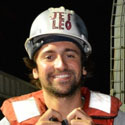
Research Assistant, University of Oslo
Oliver Kersten received his B.Sc. in Marine Biology from Hawaii Pacific University and holds a M.Sc. in Marine Science from the same university. During his graduate studies he participated in two research cruises to the Eastern Clarion Clipperton Zone (CCZ). For his thesis, he used a free-vehicle, equipped with two plankton pumps, to provide the first analysis of the near-bottom zooplankton community above the abyssal seafloor in the tropical Eastern North Pacific.
Since 2016, he holds a position as a research assistant for the multidisciplinary research group, “MedPlag”, at the University of Oslo, which investigates the ecology, transmission routes, and phylogeny of the bacterium Yersinia pestis, the causative agent of the medieval plague pandemics. However, he never lost his enthusiasm for marine science and his experience with oceanographic sampling equipment/methods, in particular plankton pumps, will benefit him on his 3rd expedition to the CCZ.
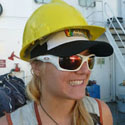
PhD Student, University of Hawaiʻi at Mānoa
Astrid Leitner is currently pursuing a PhD in biological oceanography from the University of Hawaiʻi at Mānoa in Professor Jeff Drazen’s Deep Sea Ecology Lab. She graduated from the University of California Santa Cruz with a BS in Earth and Planetary Sciences with an Ocean Sciences Concentration and a BS in Marine Biology. She is generally interested in the effects of topography, especially seamounts and abyssal hills, on the spatial distribution of animals. As part of her dissertation research, she has been studying the effects of abyssal hills on large mobile predators, scavengers, and other bait-attending animals across the Clarion-Clipperton Zone. Understanding the distribution of these creatures across the CCZ is important to understanding how this ecosystem functions. The distribution of predators can strongly influence prey populations, and so a top predator can impact the entire system from the top down. This work will also inform efforts to estimate future mining impacts and to create effective conservation and management policies.
On this cruise, she will be working with the ROV and several free vehicles to collect this data: two baited cameras, one recording video and another taking photographs over 24hr deployment periods, and a baited trap, which will catch specimens for morphological identification and genetic material. Additionally, she will be working on creating maps of this unmapped, unexplored area of the ocean. Because we will be working in an unexplored region of our oceans, creating maps is an important first step in our project.
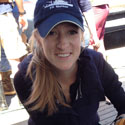
PhD Student, Plymouth University
Kirsty McQuaid’s research is focused on the application of predictive modelling to marine spatial planning associated with deep-sea mining. High quality biological data are currently lacking for many of the large, remote areas in international waters that are targeted for mining. Her research is attempting to address this issue by predicting the distribution of abyssal megafauna in the CCZ, based on more widely available environmental data that characterise habitats (e.g. food availability and depth). This work will inform spatial planning questions related to deep-sea mining.

Associate Professor, Lyell Centre for Earth and Marine Science and Technology, Heriot Watt University
Andrew Sweetman primarily studies benthic ecosystem processes in deep-sea environments using lander technologies, ROVs and submersibles. Andrew has been PI on over 20 research projects since 2007, is an expert on the impacts of anthropogenic stressors (e.g., deep-sea mining) on deep-ocean ecosystems, and has worked in the abyssal CCZ since 2012. During the cruise, Andrew will lead the benthic ecosystem functioning component of the DeepCCZ project, and will gather data on C- and nutrient-cycling processes using a deep-sea benthic respirometer lander as well as a deep-sea microprofiling lander.
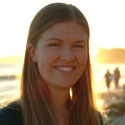
Postdoctoral Scholar, Flathead Lake Biological Station, University of Montana
Emma Wear will be sampling microbes—bacteria, archaea, and larger eukaryotes like phytoplankton—from the sediment and the overlying water, as well as any manganese nodules we collect. Her research interests are in studying what controls community composition of bacteria and archaea (that is, who's there) and community metabolic activity (how much food they’re consuming and how much they’re growing as a result). This is her first cruise focused on the deep sea, and she’s looking forward to seeing the sort of fish and invertebrates that usually only show up in nature documentaries.
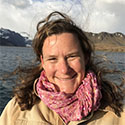
Biological Oceanographer & Associate Professor, University of Hawaiʻi at Mānoa
Erica Goetze is a Biological Oceanographer and Associate Professor in the Department of Oceanography at the University of Hawaiʻi at Mānoa. She is a zooplankton ecologist with broad interests in the ecology, genetics/genomics, and evolution of metazoan plankton. She has two research foci for her work on the DeepCCZ project: (1) diversity, community structure, and connectivity of demersal zooplankton across seamount and abyssal plain sites in the western CCZ, and (2) environmental DNA (eDNA) biodiversity surveys across abyssal CCZ habitats. Metazoan plankton collected at seamount and abyssal plain sites will provide insight into the dispersing larval stages of benthic animals and whether seamounts may serve as refugia in the context of seafloor mining. The eDNA surveys represent a new approach to assessing animal diversity and community structure in deep ocean habitats, and she is excited about evaluating these results in the context of traditional morphology-based surveys of abyssal assemblages conducted by the DeepCCZ team PIs.
She received a BA in Biology from Wesleyan University (1995), and a PhD from the Scripps Institution of Oceanography, University of California, San Diego (2004). She completed postdoctoral fellowships at the Natural History Museum in London (with A. Glover, T. Dahlgren) and the Danish Institute for Fisheries Research (Denmark), before joining the faculty at University of Hawaiʻi at Mānoa (2008).
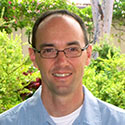
Associate Professor, Flathead Lake Biological Station, University of Montana
Dr. Matthew Church is an Associate Professor at the Flathead Lake Biological Station at the University of Montana. He received a B.S. from The Evergreen State College (1994), and an M.S. (1999) and Ph.D. (2003) in Marine Science from the College of William and Mary’s School of Marine Science. His research focuses on aquatic microbial ecology, with particular interests in those processes that control distributions, activities, and the diversity of microorganisms. Much of his research is conducted in the open ocean waters where microorganisms dominate both ecosystem biomass and metabolism.
On the DeepCCZ cruise, his team will lead the shipboard sampling and analyses of microorganisms in the water column, sediments, and associated with polymetallic nodules. The overall goal of their work on this cruise will be to gain information on the phylogenetic and functional diversity of microbes dwelling in these abyssal habitats. He is excited to participate in the cruise because so little is currently known about metabolic strategies utilized by microorganisms in these energy-poor and chronically undersampled habitats. During the cruise, his team will rely on sampling seawater using the conductivity, temperature, depth (CTD) rosette, with collections of sediment and nodule samples relying on the remotely operated vehicle.
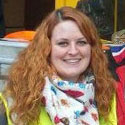
Marine Biologist, The Lyell Centre, Heriot-Watt University, Edinburgh
Annabell Moser is a marine biologist PhD student at the Lyell centre of Heriot-Watt University, Edinburgh, UK. Annabell received her B.S degree in Biology (2015) from the University of Freiburg, Germany and her M.S. degree in Marine Biology (2017) from the University Rostock. Her Master thesis was conducted in cooperation with Ronnie Glud, Nordcee group, Syddansk University, Odense, Denmark and Stefan Forster, University Rostock, Germany. She is interested in oxygen distribution in marine sediments and how different environmental factors affect it. The aim of her work is to improve methods of assessing oxygen distribution in marine sediments.
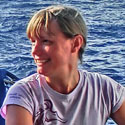
Dr. Helena Wiklund is a taxonomist and systematist working on deep-sea organisms. Her main interest and knowledge is in the marine bristleworms (polychaetes), but for the last five years she has studied a diverse range of macro- and megafauna that has been collected during two previous cruises to the Eastern Clarion Clipperton Zone. She is using both morphology and molecular methods to identify the different species and investigate their distribution ranges.
Helena got her PhD degree in 2010 at the University of Gothenburg with a thesis on polychaetes living on whale-falls, and has been working as a postdoctoral research assistant at Natural History Museum in London from 2010-2017.